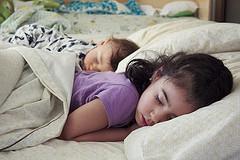Are you tired?
The question is almost inane in our fast-paced, media-saturated society. With cell phones buzzing, laptops glowing and TVs beckoning, it can be hard to shut down the electronics, and shut down our brains for bedtime.
Poor sleep hygiene (not getting enough hours of uninterrupted sleep per night) is a rampant problem in western culture, and people’s health is suffering because of it.
Lack of sleep affects physical, mental and emotional well-being. People with poor sleep hygiene have a higher risk of depression, heart disease, diabetes, headaches, weight gain, moodiness, poor immune function and causing motor vehicle accidents.
While good sleep hygiene is a necessity at all ages, it comes differently to children, adolescents and adults.
Children:
Good sleep hygiene is essential to every child’s growth and development. It’s vitally important that parents realize how important healthy sleep habits are for their children. Lack of sleep can negatively affect a child’s attention span, ability to learn and how well he/she behaves.
Children younger than 6 need 11-12 hours of sleep each night, and children ages 7-12 should be getting at least 10 hours of sleep each night. The fewer interruptions in sleep, the better the quality of sleep. Establishing routines will help children wind down for bedtime.
Tips for children:
- Create a calm, soothing bedtime ritual for children (e.g., consistent bedtime, quiet reading, soft music, etc.)
- Turn off electronics, like video games and televisions, at least an hour before bedtime.
- A warm bath before bedtime can help children relax and become sleepy.
- Avoid bright lights at least an hour before bedtime. Consider using soft nightlights in your child’s bedroom and bathroom.
- For children who wake up from nightmares or night terrors, it is helpful to cut out all sources of “scary” media like movies or video games.
- Pay attention to how your child acts and feels; if you are observe crankiness or trouble focusing, it might be due to poor sleeping habits.
Adolescents:
Achieving good sleep hygiene in adolescence can be challenging since sleep patterns naturally shift to later bedtimes. It can be difficult for adolescents to wake up for school and have full cognitive function if they are running on low sleep. Adolescents need 8-10 hours of sleep each night since their bodies and brains are still growing and developing. Poor sleep hygiene can cause hormones to be irregular in people of all ages, but this is especially disruptive for teenagers, who are already experiencing a new barrage of growth and sex hormones.
Adolescents usually have access to many electronic devices, which can interfere with sleep hygiene. Adolescents should put their cell phones away and turn televisions off at least an hour before bedtime. Light from artificial screens tricks our brains into thinking it’s daylight, which makes it harder to shut down for sleep.
Tips for adolescents:
- Have a hot bath or shower before bed.
- Don’t use electronics an hour before bed.
- Avoid bright lights an hour before bed.
- Do homework earlier, like after dinner, instead of right before bed. Doing homework right before bed can stress you out and make it hard to sleep.
- Use earplugs, eye shades or blackout curtains.
- Keep the bedroom cool rather than warm.
- Do NOT consume anything but water at least two hours before bedtime, especially caffeine.
- Try short (half an hour to an hour) after school naps. Don’t nap too close to bedtime or it may be difficult to fall asleep.
- Go to bed at the same time on the weekends as on weekdays. Adolescents who stay up late on weekends will disturb their biological clocks and cause poor sleep throughout the week.
Adults
Poor sleep hygiene is just as serious for adults as it is for youth. It can negatively impact ability to focus, cognitive functions and mood. Additionally, sleep-deprived adults may put themselves, their families and others at risk when they get behind the wheel. Adults should be sleeping 7-8 hours each night.
Tips for adults:
- Don’t hit the snooze button. Ever. Scientists say falling in and out of sleep in short bursts will disrupt brain waves, making you groggier and less focused throughout the day.
- Exercise in the morning instead of the evening.
- If you can’t fall asleep because you are stressed out about tomorrow, write a to-do list before bed.
- Avoid the use of electronics at least an hour before bed.
- Do NOT consume anything but water at least two hours before bedtime, especially caffeine or alcohol. While alcohol may help you to feel drowsy, you may wake up as the effect wears off.
- Stretch your legs, arms, back and neck before bed. If your body hurts while you’re trying to sleep, stretching each night may lessen pain and relax your muscles.
- Try short (half an hour to an hour) mid-day or early afternoon naps. Don’t nap too close to bedtime or it may be difficult to fall asleep.
If these tips don’t work for you or your children, relaxation therapy may reduce anxiety. At Family & Child Development we have several experienced and licensed therapists who can help you or your child achieve healthy sleep hygiene.

